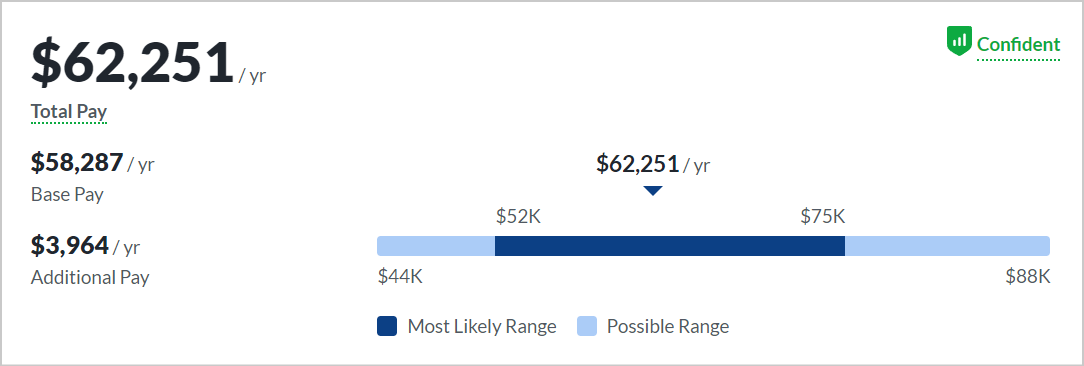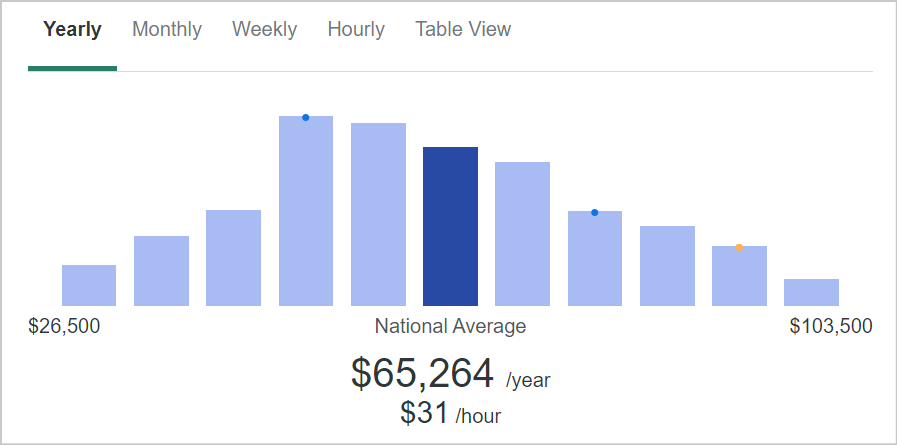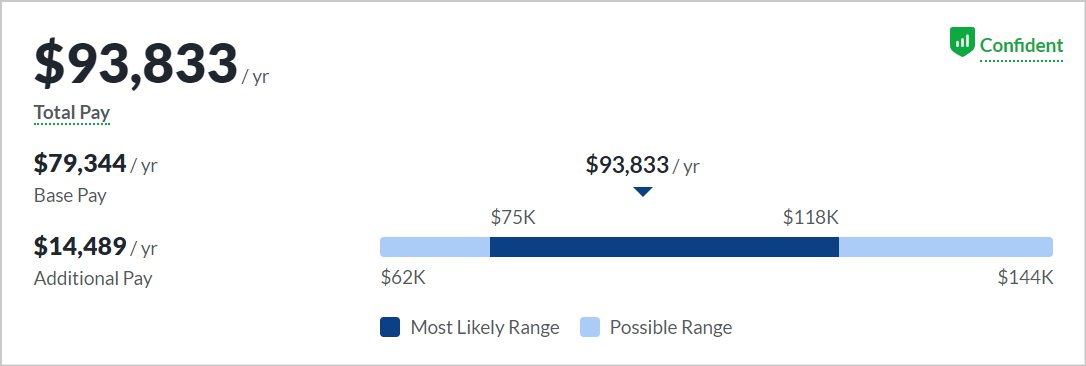Free Data Analytics Course
Jumpstart your journey with 25 essential learning units in data analytics. No cost, just knowledge.
In the past decade, marketing has undergone a revolutionary technological makeover. Decisions about content and advertising are now driven largely by the kinds of data that, up until fairly recently, have been unavailable to marketers. Marketing analysts have been key to this transition, as their skills in data analysis have helped develop better marketing strategies and more optimized advertising campaigns.
The US Bureau of Labor Statistics has promising projections for market research analysts. It expects employment in the field to grow at 19% between 2021 and 2031, which is a much higher rate than the job market overall. That means more than 150,000 openings are going to be added to the 792,000 that were already in the marketing analyst job market in 2021.
There’s clearly no dearth of marketing analyst jobs out there. However, it can be difficult to land a job as a marketing analyst, as the job requires expertise in two seemingly disparate disciplines—marketing and data analysis.
In this article, we’ll outline the step-by-step process that you can follow to gain the skills required to become a market analyst. We’ll also look at the education foundations, technical chops, and job-hunting tactics required for success in this field.
Is It Hard To Become a Marketing Analyst?
Becoming a marketing analyst is easier if you already have experience with either data analysis or marketing. Say that you’re already a data analyst. If you’ve already got that covered, then you need to shift your focus to understanding how modern marketing works and learning how data can be used to produce marketing analytics.
What Does a Marketing Analyst Do?
Marketing analysts use their analytical skills and marketing industry knowledge to help organizations with their marketing efforts. Data analysis is used in various ways in marketing, including to study market conditions, analyze customer behavior, produce effective marketing campaigns, and explore how to gain a competitive advantage in the market.
How To Become a Marketing Analyst: A Seven-Step Guide

Market research analyst jobs provide an exciting career opportunity with scope in a wide range of industries. Let’s now take a look at how you can land a marketing analyst position and meet the job demands of the industry. Follow these seven steps:
-
Meet the Educational Qualifications Needed (And Go Beyond)
-
Hone Your Skills
-
Learn the Essential Tools
-
Invest Time in Practical and Real-World Experience
-
Pursue an Internship
-
Your Network Is Your Net Worth
-
Start Applying
Meet the Educational Qualifications Needed (And Go Beyond)
Marketing analysts need to have a strong understanding of data analysis, as well as how it can be used to make informed decisions in marketing. Education is essential if you want to possess the right data and marketing skills for the job. Here are a few ways you can get that education:
University Degree
Getting an undergraduate degree is a tried-and-tested path to becoming a marketing analyst. A marketing degree or business degree can be the right choice if you want to start with a foundational understanding of the industry. You can also consider a computer science or information technology degree so that you have a grasp of working with data.
Bootcamp
While degree programs give you broad exposure to the field, they can also be costly and time intensive. Bootcamps are a great alternative because they have a narrow focus and quickly give you in-depth knowledge of a field. A data analysis bootcamp can give you the technical skills required for marketing analysis.
Other Learning Resources
A professional certificate can be a great resource to learn marketing principles, and some are explicitly required for market research analyst positions. The Insights Professional Certification and Certified Market Research Analyst are both certificate programs that you should consider doing to boost your career prospects.
Here are a few other resources that you can use to keep abreast of developments in marketing analytics and enhance your skills:
- Occam’s Razor blog
- Google Analytics Academy
- Online Behavior blog
- Predictive Analytics World
Hone Your Skills
Once you have the educational background, it’s time to focus on honing specific skills that you will require in the workplace. Let’s take a look at what they are.
Technical Skills
These technical skills are required for a marketing analyst role:
Advanced Data Analytics
Marketing analysts have a great understanding of the data analysis process from start to finish. That means that you know how to choose the right sources for data, clean data, warehouse it, and carry out data analysis with the goal of producing meaningful insights for your company.
Marketing Research
There’s a lot of research that goes into decisions taken by marketing analysts. You should be able to research competitors, new social media platforms, marketing data, and customer analytics. Being able to report and present the results of your research are ancillary skills that come into the picture here.
Attribution Modeling
This is a skill that’s quite unique to the marketing analyst job role. Attribution modeling is the process of finding out which sources and tactics have led to a conversion. That means that you quantify the success of various channels, such as content marketing, email newsletters, Instagram ads, and so on.
Forecasting
Not all of the work that you do as a marketing analyst will involve analyzing results after the fact. In certain cases, you need to be able to forecast how a specific market segment will respond to a product. MATLAB and Microsoft Excel are two tools that are extensively used for forecasting in marketing analysis.
Soft Skills
Creativity is a key soft skill in marketing analysis. And that doesn’t just mean creativity in coming up with ideas for campaigns. You should be creative in your ability to identify patterns in data and come up with ways to enhance lagging KPIs.
Here are some other soft skills that are key in this field:
- Communication
- Critical thinking
- Teamwork
Learn the Essential Tools
The tools that you use as a marketing analyst will depend on the goals of the project that you’re working on. The following tools are used across the industry to collate and analyze data from various sources:
- MixPanel
- Optimizely
- SEMRush
- Whatagraph
- Google Analytics
- Zuko
- Woopra
- Leadfeeder
As you can see, there are plenty of tools that are in use out there. But don’t let that intimidate you. If you don’t have any experience yet, start with a simple tool like Google Analytics.
Invest Time in Practical and Real-World Experience
You can only get so far in learning theoretical concepts and completing certifications. At some point, you have to jump into the deep end and start learning about how those things are applied in the real world. Here are a few ways you can get that done before you land a job.
Work On Sample Projects
Working on your own projects is the easiest way to start off applying what you’ve learned. There’s a range of data science projects that you can pick from. You can also find publicly available datasets and conduct your analyses on them.
Pursue Volunteer Work
You can approach organizations such as non-profits and small businesses offering pro bono marketing analyst work. Since most of them will have an active marketing operation, you won’t have too hard of a time selling them on the idea.
Pursue an Internship
Internships are the perfect stepping stone to a career as a marketing analyst. The main benefit of an internship is that you get a feel of the day-to-day life of a marketer. And then of course, you will get to work on marketing analysis tools and have the opportunity to contribute to live projects.
You can look up just about any job site and find internship opportunities. You might also consider writing to companies in your area to find out if they’d be open to hiring an intern. Don’t forget to include your resume and any portfolio items that you might have.
Get To Know Other Data Analytics Students
Cana Curtis
Research Analyst at Virginia Commonwealth University
Sarah Savage
Content Data Analyst at EdX
Bart Teeuwen
Global Business Analyst, Global Talent Intelligence (GTI) at Meta
Your Network Is Your Net Worth
Networking is one of the most high-impact things you can do to land a job. The more people you meet in the marketing and data analytics space, the more likely you are to find out about openings at companies and get referred to some of them. Here are a few ways you can build your network:
LinkedIn is the largest professional social media network in the world. You can use it to find both experts in marketing analysis and professionals in the industry locally. Make sure to take your time building your relationship with connections by interacting with their posts. Only after you’ve done that should you consider asking for jobs or mentorship.
Online Communities
Here are a few communities you can join to meet others who are passionate about marketing analysis:
Conferences and Meet-ups
Meetup.com is a site you should join so that you know about local events in the marketing and data community. You should also keep a tab on marketing conferences happening around the country because they’re a great opportunity to meet industry influencers and recruiters.
Start Applying
Once you’ve worked on your skills and have a few projects under your belt, it’s time to start applying. Let’s take a look at how you can do that most effectively:
Practice Your Interview Skills
There are specific marketing and data analysis questions that come up again and again in interviews. You can make interviews a lot easier by studying these questions thoroughly.
You’ll also need to work on your interview soft skills. Communication, body language, and confidence are all just as important as, say, knowing how to choose a data model for a particular marketing dataset. You can work on those skills by doing mock interviews with friends and family. You can also record yourself delivering answers and use that to improve your soft skills in an interview.
Research the Companies You’re Applying To
During your interview, you’ll probably be asked about why you want to work there, how you can help the organization, and what you know about it in general. You should research the company so that you can answer all those questions confidently.
Start your research by perusing the company’s website thoroughly. This will give you plenty of information that you can use in your interview. You can also connect with the company’s CXOs on LinkedIn so that you’re aware of the goings-on there and what their core values are.
Tailor Your Resume to Each Role
Recruiters have very little time to go through each resume that reaches them, so make sure to only include the most relevant information in your resume. Go through your resume before each interview and ensure that everything in there is related to the marketing analyst field and shows that you’ve got the skills required for the specific role that you’re applying to.
Transitioning to a Career as a Marketing Analyst: Where To Start

The path you take to a career as a marketing analyst will vary depending on where you are in your career. Let’s take a look at how you can take the best route there based on that.
Related Career Transition
Data analysis, marketing strategy, and business administration are all careers that are related to marketing analysis. That means that you will have a lot easier time landing a job because you already have a partial skillset.
All you need to do from there is fill in any gaps in your knowledge of the field and start applying for jobs. You should definitely check if your company is hiring marketing analysts so that you can make a lateral move.
Unrelated Career Transition
Moving into marketing analytics from an unrelated career means that you have to go back to being a student all over again. Prepare to spend a significant amount of time studying data analysis, marketing processes, and software tools. Consider doing an internship so that you can ease into a career in marketing analysis with your newfound skillset.
Marketing Analyst Career Path
If you decide to follow this career path, you’ll most likely begin your career in marketing analysis as a junior analyst. This is when you’ll be given basic tasks such as data mining or producing campaign reports. Once you have three to five years of experience under your belt, you’ll be able to seek out roles as a senior analyst, where you’ll work on activities like trend forecasting and market research.
At around the ten-year mark, you can start applying for a marketing manager or project manager roles. Managers take responsibility for entire projects and have a team working under them. You’ll produce project specifications, assign tasks, and ensure that deliverables come through when they’re supposed to.
The most promising managers make it to the post of marketing director or VP of marketing. This is a position in which you will handle all of the marketing activities of the company. You’ll lay down the vision of the department and come up with yearly goals for all of the teams that work for you.
How Much Can You Earn as a Marketing Analyst?
Marketing analysis is increasingly becoming a lucrative career option. Let’s take a look at how much you can make at different stages of your career.
Entry-Level
Marketing analysts in entry-level positions make $62,251 a year on average.

Mid-Level
Marketing analysts in the 75th percentile earn $76,000 and that’s about how much you can expect to make as a mid-level professional in the industry.

Senior
Senior marketing analysts have an average salary of $93,550.

Resources To Find Marketing Analyst Jobs
Here are a few places that you should track to find marketing analyst vacancies.
Job Boards
The following job boards post open roles for marketing analysts.
LinkedIn is a treasure of open roles across industries. Simply look up “marketing analyst jobs” and you’ll instantly find hundreds of open roles. You can refine your search to look for jobs in specific places or of a particular job type (full-time, contract, etc).
Network
Networking helps you find jobs that aren’t posted on job sites, and it’s a lot easier to land a job when you get a referral for it. So try to meet as many managers, recruiters, and fellow early career professionals as possible.
Slack Communities
Here are a few Slack communities you should join to learn more about marketing analysis and find out vacancies.
- Demand Curve
- Growmance
- Growth Marketers by Bamboo
How To Become a Marketing Analyst FAQs
We’ve got the answers to your most frequently asked questions:
Are Marketing Analysts in Demand?
Yes, marketing analysts are in demand. The Bureau of Labor Statistics projects that more than 150,000 jobs will come up in the industry between 2021 and 2031.
What Qualifications Do You Need To Become a Marketing Analyst?
You can build a career as a marketing analyst with a degree in computer science, marketing, or data science. You can also complete a bootcamp in data analytics or marketing analytics and use that to enter the industry.
Can You Become a Marketing Analyst Without a Degree?
Yes, you can become a marketing analyst without a degree. Companies are open to hiring bootcamp graduates and self-taught individuals who have a portfolio of work showcasing their skills.
Is Marketing Analytics a Stressful Career?
Marketing analytics can be a demanding career where you have a large volume of work coming in during festival seasons and so on. That said, you can always work with your manager to reassess your workload so that you can maintain your productivity over long periods of time.
Since you’re here…
Considering a career in data analytics? We can get you there. Don’t take our word for it – check out our student reviews. After just 6 months of study in our fully flexible Data Analytics Bootcamp, we’ll boost you into a job in the field or your tuition back. Get started now with our free data analytics course.






